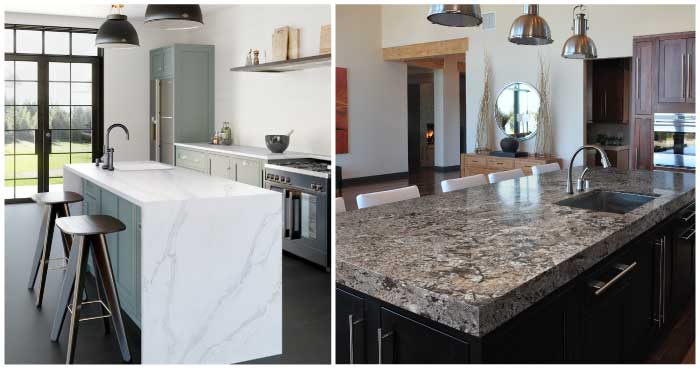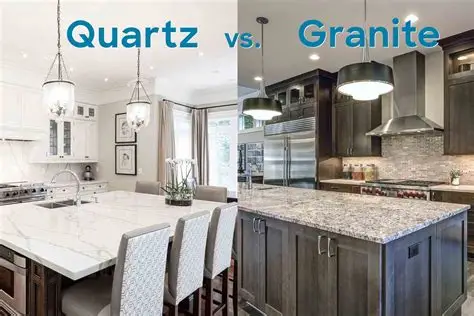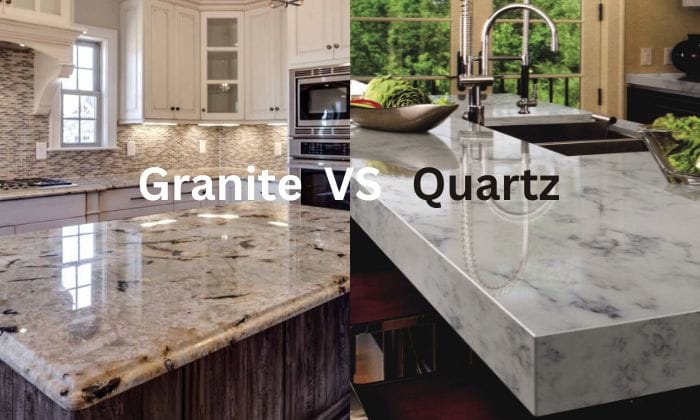
When designing or renovating a kitchen, one of the biggest decisions you’ll make is choosing between granite countertops and quartz countertops.
When designing or renovating a kitchen, one of the biggest decisions you’ll make is choosing between granite countertops and quartz countertops. Both options have passionate fans, and each offers unique benefits in terms of style, durability, and maintenance. But when it comes down to the question—are granite countertops better than quartz?—the answer depends on your priorities, budget, and aesthetic vision.

Understanding Granite Countertops
Granite is a natural stone formed deep within the Earth when magma + what equals granite?. This igneous rock is quarried, cut into slabs, and polished for residential and commercial use. Its natural beauty lies in unique veining, speckling, and colors that vary from slab to slab.
Key Features of Granite:
- Durability: Extremely hard and resistant to scratches.
- Heat Resistance: Withstands hot pots and pans without damage.
- Natural Variation: Every slab is one-of-a-kind.
- Longevity: Can last decades with proper care.
Granite comes in many varieties, such as:
- Black granite countertops – Sleek and modern
- White granite countertops – Timeless elegance
- Brown granite countertops – Warm and traditional
- Blue pearl granite countertops – Bold and luxurious

Understanding Quartz Countertops
Quartz countertops are engineered stone surfaces made from crushed natural quartz mixed with resins and pigments. They’re designed to mimic the look of natural stone while offering enhanced durability and consistency.
Key Features of Quartz:
- Non-Porous Surface: No sealing required, stain-resistant.
- Uniform Appearance: Consistent patterns and colors.
- Low Maintenance: Easy to clean and care for.
- Design Versatility: Available in patterns resembling marble, granite, and solid colors.
Granite vs Quartz: Durability and Resistance
Granite Countertops:
- Naturally resistant to heat and scratches.
- Requires periodic sealing to prevent staining.
- Can be affected by acids if not sealed properly.
Quartz Countertops:
- Resistant to stains and bacteria growth.
- Slightly less heat-resistant than granite.
- Not prone to etching or requiring sealing.
If low maintenance is your top priority, quartz takes the lead. But if you value natural heat resistance, granite may be better.
Style and Aesthetic Appeal
Granite offers natural patterns and colors—no two slabs are identical. This uniqueness is a major selling point for homeowners who value individuality. Granite’s aesthetic pairs beautifully with granite kitchen countertops in rustic, traditional, or luxury designs.
Quartz provides a more consistent look, which can be ideal for contemporary or minimalist kitchens. If you want exact color matching across multiple surfaces, quartz is a strong choice.
Cost Comparison
- Granite countertops: $40 – $200 per square foot installed.
- Quartz countertops: $50 – $220 per square foot installed.
The price largely depends on rarity, thickness, edge detail, and installation complexity. For more details, see:
Maintenance Requirements
Granite requires periodic sealing, usually once a year, to maintain stain resistance. Quartz, being non-porous, does not require sealing. Both materials can be cleaned with mild soap and water.
For natural stone lovers, sealing granite is a small price to pay for its authenticity. For convenience-focused homeowners, quartz’s minimal upkeep is appealing.
Environmental Impact
Granite is a natural product, but quarrying and transport can be energy-intensive. Quartz is engineered, but it uses waste stone from other manufacturing processes, making it more sustainable in some cases.
Pros and Cons Summary
| Feature | Granite Countertops | Quartz Countertops |
|---|---|---|
| Heat Resistance | Excellent | Moderate |
| Stain Resistance | Good (with sealing) | Excellent |
| Scratch Resistance | Excellent | Excellent |
| Maintenance | Moderate | Low |
| Natural Look | Unique | Consistent |
| Cost Range | Moderate–High | Moderate–High |
Which Should You Choose?
- Choose Granite if: You want a completely natural surface, don’t mind periodic sealing, and love the idea of a unique, one-of-a-kind slab.
- Choose Quartz if: You want uniformity, easy maintenance, and don’t need maximum heat resistance.
For more on the differences:
Expert Tip: Plan for Installation Logistics
Both granite and quartz are heavy materials that require professional installation. Specialized tools, like a kerb stone lifter or slab trolley, ensure safe handling.
The Geological Story Behind Granite
Granite’s journey from deep Earth to your kitchen is fascinating. Over time, what geologic process can change granite into gneiss? — this transformation is part of the rock cycle, showcasing its durability and timeless nature.
Final Thoughts
The debate between granite and quartz countertops isn’t about which is universally “better,” but rather which is better for you. Granite appeals to those who value natural beauty and individuality, while quartz attracts homeowners who prioritize ease of care and uniform style.
No matter your choice, both options can elevate the look, feel, and value of your home—making them two of the best granite countertops for kitchens and bathrooms available today.

